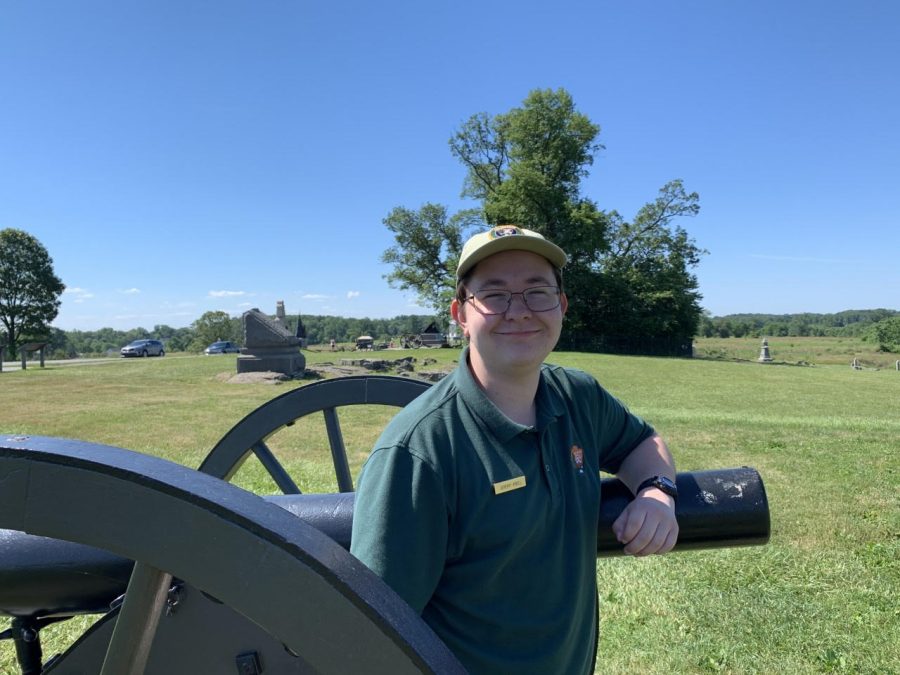NIU student volunteers at Gettysburg
Courtesy of Jeremy Knoll
Jeremy Knoll, a senior majoring in history at NIU, stands on the site of the Battle of Gettysburg. This summer, Knoll interned with the National Parks Service, conducting tours and educating visitors on the history of the battle.
November 17, 2021
Gettysburg, Pennsylvania. It’s hard to believe a place so small was the site of a massive battle that decided the fate of America. This three-day battle left tens of thousands of young men laying on the farm fields dyed scarlet and moist with blood. A century and a half later, the site of the Battle of Gettysburg is now a national park to commemorate the turning point of the American Civil War. Thousands of people volunteer every year to educate tourists about the battle.
One of them is an NIU Huskie.
Jeremy Knoll, a senior double-majoring in history and economics, has always had a profound love for American history, particularly the period of Abraham Lincoln. Growing up in Springfield, Illinois, Knoll was surrounded by the legacy of America’s 16th president with the Abraham Lincoln Presidential Library and Museum, Lincoln’s Illinois home and Lincoln’s tomb, all located within three miles of each other.
“My parents really drove my passion for Lincoln and for history,” Knoll said.
After applying and being accepted for an internship at the battle site, Knoll spent the entire summer of 2021 in the small Pennsylvania town of Gettysburg. This town was the site of a battle that turned the tide of the American Civil War.
From July 1 to July 3, 1865, the Union’s Army of the Potomac, commanded by General George Meade, defeated General Robert E. Lee’s Army of Northern Virginia, which had been amassed to conduct an invasion of the Union. This defeat annihilated one-third of Lee’s forces and made sure that the Confederacy never had the strength to invade the Union again, according to the History Channel’s website.
From the last week of May to early August, Knoll was surrounded by the very history he spent years reading about. Working at the Visitors Center, Knoll helped answer tourist questions about how to experience the battlefield.
Knoll was also given the chance to conduct 45-minute tours of the Gettysburg National Cemetery. On these tours, he would show the graves of the Union soldiers who perished in the battle (the Confederate dead being taken back to their homes), paying close attention to the dead of Illinois. And, towards the end of the tour, Knoll would point out one of the most important pieces of land in American history: the site of Lincoln’s Gettysburg Address.
Working for the National Parks Service not only gave Knoll a closer look at the Civil War’s most important battle but also put him in the unique perspective of a soldier fighting and dying in the hills of Pennsylvania.
“It reinforced all of the awful truths Civil War soldiers went through,” Knoll said. “During the summer, we wore wool Union uniforms, and they were unbearable. So imagine wearing them with pounds of equipment, running up hills and being shot at. It reinforces the sacrifice of these men.”
What makes Gettysburg special is not only its historical significance but that it’s also the most well-known battle of the entire war, Knoll said. While Civil War buffs who build models in their basements and participate in reenactments may know everything about the battles of Antietam, Chancellorsville, Vicksburg and Spotsylvania, Gettysburg is the battle the average American can name off the top of their head. It’s also the most visited battle site of the entire National Park Service, drawing over one million visitors every year, according to the National Park Service.
“What I learned from this was the impact history still has on us,” Knoll said. “You think history is facts in a textbook, but Gettysburg means so many things. People with ancestors who fought come here.”
Knoll plans on becoming a history teacher and delivering the true, complicated history of the Civil War. Many Americans have an overly simplified view of the war, Knoll said. Most view it as a war of the Union fighting to end slavery and the Confederacy fighting to keep it. While the Confederacy was conceived to preserve the institution of slavery, the United States of America fought to preserve the union and end the South’s rebellion. It took many developments for the 13th Amendment to enter American conversation and to be passed.
After his graduation next spring, Knoll intends to go to graduate school where he will get a master’s degree in history and pass on his knowledge of the American Civil War to inspire students.
“I still intend to stick with the academic side of history,” Knoll said. “I’m not sure if I see myself working in public history, but I’ll definitely visit again. I leave my possibilities open.”







